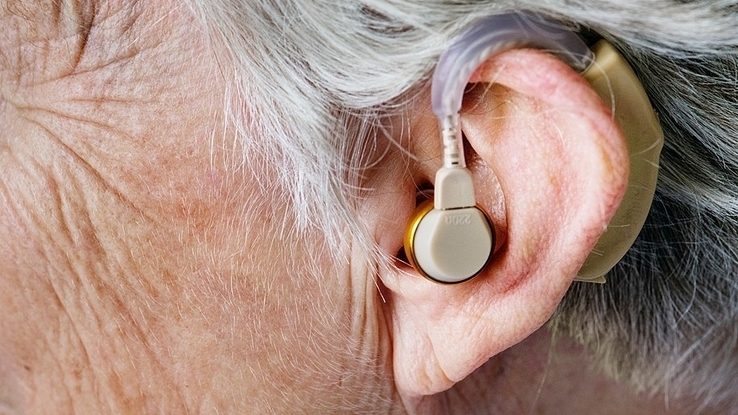
Tinnitus is more common than you think. 50 to 60 million Americans experience some form of it, with 20 million of those people having it regularly and two million of them having a severe form.
While tinnitus is rarely a sign of serious health problems, it can be irritating. Although there is no reliable cure for chronic tinnitus, there are things you can do to make tinnitus more manageable if it’s bothering you.
What Is Tinnitus?
Tinnitus is the perception of noise without an external source, especially a ringing noise. It can also take the form of a whooshing sound, clicking, whistling or even music. The sounds people hear from tinnitus vary, and they can come and go or remain constant. Tinnitus isn’t a disease or disorder, but rather a symptom of other issues. Stress, exhaustion and age can make tinnitus seem worse, and people are often bothered by it more at night when there are no other sounds to distract from it. For many people, tinnitus becomes less bothersome over time as they adjust to it, although that’s not always the case. Most people who have it are over age 55.
Although the sounds associated with tinnitus can often only be heard by the person in question, other times, it can be observed by other people. For instance, a person with a heart murmur may experience a whooshing sound with every beat of their heart, and a doctor could observe this form of tinnitus with a stethoscope. This is called objective tinnitus as opposed to subjective tinnitus, which only the person in question can hear.
Causes of Tinnitus
People often never learn the cause of their tinnitus, but that’s not a cause for alarm, as tinnitus is rarely caused by urgent health problems. That said, if your tinnitus sets in after a cold or other upper respiratory infection, you should make an appointment with your doctor. Similarly, if it’s accompanied by dizziness, hearing loss or occurs rapidly without obvious cause, you should visit a doctor as soon as possible. The cause is likely still benign, but it should be investigated.
Some things that can be known to cause tinnitus include hearing loss, loud noises, head injury, migraines, hearing loss, caffeine usage, smoking cigarettes, wax buildup, certain tumors, anemia,some drugs and medicines, stress or anxiety, high blood pressure, migraines, Ménière’s disease and more. A factor common to many of these sources is inner ear hair cell damage. These minute hairs move in reaction to sound waves, sending a signal from your auditory nerve to your brain. Damage to these hairs can cause them to send random signals to your brain, which you “hear” as tinnitus.
Treatment Through Wellness
Because tinnitus can be caused by everything from too much caffeine to stress to high blood pressure, healthy living habits can improve the underlying causes of tinnitus, which in turn can lessen or even stop tinnitus itself. These practices include eating a healthier diet, consuming less caffeine or alcohol, engaging in physical activity and lowering personal stress, either through counseling or other means. If you work in an environment with loud noises, ear plugs can also help reduce and even prevent tinnitus, as can lowering the volume at which you listen to music, especially through headphones.
Medication
Taking medication — and not doing so — can help with tinnitus. While no medications currently approved by the U.S. Food and Drug Administration (FDA) can cure tinnitus, certain antidepressants, such as clomipramine, desipramine, imipramine, nortriptyline and protriptyline, can reduce it. The same is true of some anti-anxiety drugs, such as alprazolam, clonazepam, diazepam and lorazepam.
Certain medications can also cause tinnitus as a side effect, and it may end once the medicine is no longer taken. These include some antibiotics, such as neomycin, erythromycin, vancomycin and polymyxin B, quinine-based medications, certain antidepressants, some diuretics, such as furosemide, ethacrynic acid and bumetanide, and some cancer medications, such as methotrexate and cisplatin. Even aspirin can cause tinnitus when taken in extreme doses, especially 12 or more a day.
While some supplements and homeopathic treatments claim to treat tinnitus, none have been verified by the FDA. This includes ginkgo biloba, which showed no significant effect in clinical trials.
Hearing Aids and Masking Devices
Many (although not all) people who suffer from tinnitus have also experienced some type of hearing loss, whether from age, injury or other causes. Hearing aids can be particularly useful for such cases since the ability to perceive more external sounds can reduce the perception of tinnitus.
Masking devices are similar to hearing aids, but instead of amplifying external sounds, they produce white noise that distracts from the symptoms of tinnitus. There are also wearable devices that play a personalized frequency to cancel out tinnitus and help you not focus on it. This is called tinnitus retraining and often includes counseling.
Therapies
In addition to tinnitus retraining, there are other therapies that can help people manage their tinnitus. Cognitive-behavioral therapy (CBT) can help people better manage their response to tinnitus by working with a trained counselor. Biofeedback can help end the vicious cycle of stress causing tinnitus and tinnitus causing stress by teaching how to manage bodily responses through the use of electrodes. Even hypnosis, electrical stimulation and relaxation therapy can help.
While some people with tinnitus experienced positive results with acupuncture, the practice has not been shown to have a significant impact on it.
Other Treatments
Depending on the nature of a person’s tinnitus, other treatments may be beneficial as well. Earwax removal can help if the condition is caused by impacted earwax, while if it’s related to blood vessels, you may need related medication or surgery. If you have a temporo-mandibular joint (TMJ) disorder, treating it may also help tinnitus. White noise machines can help distract people with many kinds of tinnitus.
Resource Links:
https://www.asha.org/public/hearing/Tinnitus/
https://www.mayoclinic.org/diseases-conditions/tinnitus/symptoms-causes/syc-20350156
https://www.soundrelief.com/tinnitus/
https://www.tinnitus.org.uk/tinnitus-and-tmj
https://www.ata.org/understanding-facts
https://www.ata.org/managing-your-tinnitus/treatment-options/drug-therapies





